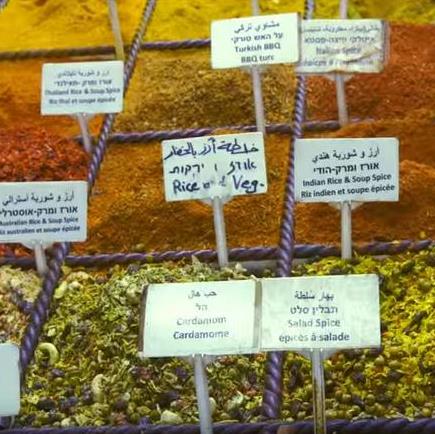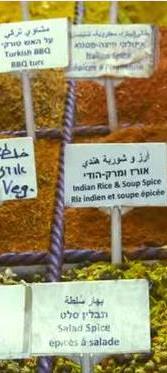
Banner

Israeli food a hit among world cuisine
BEV GOLDMAN & ANT KATZ
ABOVE: Cameras follow chef Solo as he shows the world a cuisine whose time has come. This is the story of cultures coming together, foods that were brought from far and wide to become the unique Israeli cuisine of today
In just 30 years, Israel has gone from virtually having no fine food to call its own, to a cuisine that is world-renowned. For a country so frequently associated with political drama, the impact of films by an Israeli-American chef who grew up in Pittsburgh and is eating his way through Israel, gives the world a completely new insight into the country.
Cast your mind back to the history of the Jewish people, from time immemorial. It goes like this: “They fought us. We won. Let’s eat.” Period.
No getting away from the fact that food is an integral part of being Jewish. It’s always there, it’s always sumptuous; it’s always abundant; and the competition, whether among caterers to the masses or kitchen gurus to the select elite, is fierce.
We Jews love our food; we love it enough to criticise it constantly, to complain about it, to reassure ourselves that WE can make it better, that this particular salad needs so many additional ingredients to give it JUST the right flavour, that the eggs were slightly undercooked and the crumpets too crispy, that the desserts were too colourful, that there were only three choices of meat…
But hey: nothing is ever left over! All is gone… Plates left spotless and shining.
Celebs and street plebs
And now (maybe not so now – but for a while now) Israeli food is claiming its rightful place among the gourmet celebs and street plebs. Israeli chefs are making their mark internationally. Israeli cuisine is being recognised and applauded. And so it should be.
Ask any Israeli. Ask any American visitor to Israel. Ask any South African tourist, at least the ones fortunate enough to be able to enjoy it despite the devastating exchange rate.
In just 30 years, Israel has gone from having virtually no fine food to call its own, to a cuisine that is world-renowned. For a country so frequently associated with political drama, the impact of films by an Israeli/American chef who grew up in Pittsburgh and is eating his way through Israel, gives the world a completely new insight into the country.
Emmy Award-winner Roger Sherman’s tantalising documentary, The Search for Israeli Cuisine, is now being screened to sold-out audiences at film festivals across the United States (and hopefully will come to SA).
It is a scrumptious, delectable portrait of Israel’s chefs, Israeli food, and the Israeli people who delight in it. The guide for Sherman’s film is Israeli-American chef Michael Solomonov who is also hailed as one of the trendsetters of the “No Waste Kitchen” movement now popular in US restaurants.
We have all read of the obscene wastage of food that is characteristic of American restaurants: Solomonov is one of a growing number of chefs committed to “zero-waste cooking, a method that utilises the whole animal as well as vegetable scraps”.
Ancient flavour, herbs, spices
Much of modern Israeli cooking is rooted in the traditions of the Mediterranean, Middle East and North Africa. These chefs, many of whom are working in the US, combine ancient flavours with popular herbs and spices: those in Israel do the same.
The rise in popularity of good and unusual food in Israel has given birth to innovative farmers, world-class chocolatiers, cheese artisans and street foodies; and what they produce is accompanied by the magic liquids flowing from boutique wine-makers and craft beer brewers.
Chef and baker Erez Komarovsky, interviewed in The Search for Israeli Cuisine, says of this new food: “What we have here is confusion food. It’s all mixed together beautifully: traditional spices, techniques, dishes that intermingle with all the influences.
“After https://www.sajr.co.za/images/default-source/places/israel/israel-cuisine.jpg” class=”sfImageWrapper”> More recently, when droves of Russian migrants arrived and suddenly represented one in four Israelis, their culinary preferences were added to the mix – and signage in markets included Russian.
More recently, when droves of Russian migrants arrived and suddenly represented one in four Israelis, their culinary preferences were added to the mix – and signage in markets included Russian.
Today, as illustrated in the spice market picture right and above, the large influx of French and Belgian migrants is beginning to show the same historical influences at markets and on tables
There are French restaurants (or restaurants where French-speakers gather) and, as can be seen in the screen grab of a spice stall from the film’s trailer, above, goods are priced in Hebrew, Arabic, English and French.
Eating in Israel, home-cooked or out, takes one into dozens of tempting fancies to tickle the palate. Whatever your preference of the day, one can satisfy the need for a warm, full, sated and exquisitely contented belly.
But hey! Some of these chefs need to come to South Africa and share their ideas and presentations too. SA needs more real Israeli restaurants; more real Israeli street food. The SA public need to see that Israel is not only conflict and antagonism, but sheer joy in living and sheer eating pleasure.




